Conclusion
We have argued that Lehrer's definitions of coherence and justification have serious technical defects. As a result, the definition of justification is both too weak and too strong. We have suggested solutions for some of the problems, but others seem irremediable. We would also argue more generally that if coherence is anything like what Lehrer's theory says it is, then coherence is neither necessary nor sufficient for justification. While our current objections are directed at the ‘letter’ of Lehrer's theory, other criticisms can be aimed at its very ‘spirit’. We would argue that coherence is unnecessary for justification because of the existence of ‘basic beliefs’, those about self-presenting states (‘I have a tingling sensation in my leg’) or self-evident truths (‘All men are men’). Such beliefs may be justified even though there are no other propositions in the subject's acceptance system that makes them more probable than competitors. Coherence is, moreover, insufficient for justification, because it ignores the inferential structure of the subject's acceptance system, and requires no justification of any kind for the subject's acceptance system itself. But we must develop these more fundamental objections on another occasion.
Similar content being viewed by others
References
Bender, J. W.: 1988a, ‘The Ins and Outs of Metaknowledge’,Analysis 48(4), 167–76.
Bender, J. W.: 1988b, ‘Knowledge, Justification, and Lehrer's Theory of Coherence’,Philosophical Studies 54, 355–81.
BonJour, L.: 1985,The Structure of Empirical Knowledge, Harvard University Press.
BonJour, L.: 1986, ‘The Coherence Theory of Empirical Knowledge’, in P. Moser (ed.),Empirical Knowledge, pp. 116–43, Roman and Littlefield. Reprinted fromPhilosophical Studies 30 (1976), 281–312.
Chisholm, R. M.: 1948, ‘The Problem of Empiricism’,Journal of Philosophy 45, 512–17.
Davis, W. A. and J. W. Bender: 1989, ‘Fundamental Troubles with Coherence’, in J. W. Bender (ed.),The Current State of the Coherence Theory, Philosophical Studies Series, pp. 52–68, Kluwer Academic Publishers.
Lehrer, K.: 1974,Knowledge, Oxford.
Lehrer, K.: 1979, ‘The Gettier Problem and the Analysis of Knowledge’, in G. Pappas (ed.),Justification and Knowledge, pp. 65–78, D. Reidel, Dordrecht.
Lehrer, K.: 1986, ‘The Coherence Theory of Knowledge’,Philosophical Topics 14, 5–25.
Lehrer, K.: 1988, ‘Metaknowledge: Undefeated Justification’,Synthese 74, 329–47.
Lehrer, K.: 1989, ‘Coherence and the Truth Connection: Reply to my Critics’, in J. W. Bender (ed.),The Current State of the Coherence Theory, Philosophical Studies Series, pp. 253–75, Kluwer Academic Publishers.
Lehrer, K. and S. Cohen: 1983, ‘Justification, Truth, and Coherence’,Synthese 55, 191–207.
Author information
Authors and Affiliations
Rights and permissions
About this article
Cite this article
Davis, W.A., Bender, J.W. Technical flaws in the coherence theory. Synthese 79, 257–278 (1989). https://doi.org/10.1007/BF00869626
Issue Date:
DOI: https://doi.org/10.1007/BF00869626



